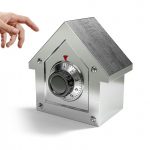Got a Financial Emergency?
![]()

Emergencies have a way of sneaking up on you when you least need them and they are, of course, completely unexpected. And when the unexpected happens, you can hardly be blamed if you made no provision in your household or personal budget to deal with it. The result – a financial emergency.
To make matters worse, it’s also that time of year when an otherwise annoying inconvenience might turn into a full-blown emergency. Think about:
- your central heating boiler breaking down whilst you’re watching the snow falling outside, for instance; or
- the car you rely on for getting to work skidding on the ice and currently laid up in the garage awaiting repairs.
Naturally, you need to deal with both of these unfortunate incidents and arrange for the repairs to be made as quickly as possible. But you’ve been caught well and truly on the hop and don’t have the ready cash available.
So, the boiler or car needs to be fixed, but you don’t have the cash – so what are your options?
Credit card
They’re pocket-sized, handy and almost certain to be in more or less constant use. Your credit card may be one of the very first turn-to solutions when you’re short of the cash you need to face some emergency.
Perhaps they’re a little too handy. According to The Money Charity, each household in Britain has an average of £2,452 outstanding on their credit cards. The interest on your credit card debt is certainly not cheap, but more of a worry perhaps is that making the minimum monthly repayment on that £2,452 balance at current average rates of interest is going to take 25 years and 6 months.
25+ years seems to be a very, very long time to be paying off that bill for fixing your central heating boiler or repairing your car.
Payday loans
As a source of more or less instant cash, just when you need it, but only for so long as you need it are payday loans.
Instant payday loans are just that – you typically spend just a minute or two making your application for a loan online, and the cash you requested is transferred directly into your bank account the very same day.
Perhaps even more importantly, though, is that you get to repay that payday loan in no time at all. It’s called a payday loan because in most instances you agree to repay the advance the next time you are paid – no longer than around 31 days away. But there are lenders these days offering short-term payday loans for as long as 18 months – still a considerably shorter time than most people get to repay their credit cards.
Unauthorised overdrafts
If you have a bank account, you might be tempted just to spend what you need to deal with the emergency that has arisen and only worry later whether there’s enough money in your account to cover it.
Given the fees and penalties invariably charged by banks for such unauthorised borrowing, this is most unlikely to be an attractive proposition.






